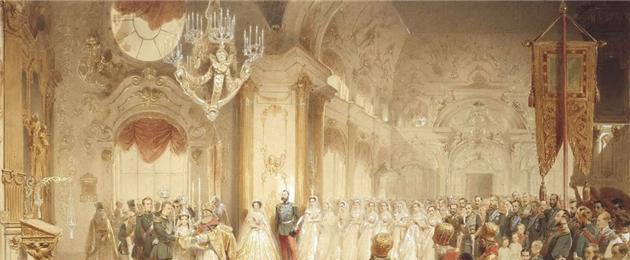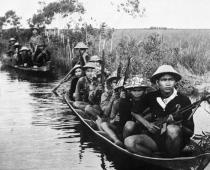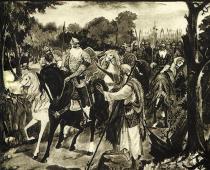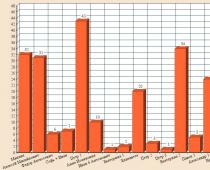On March 10 (February 26, old style), 1845 - exactly 165 years ago - the following message was printed in the Vedomosti of the St. Petersburg City Police: " On February 26, Her Imperial Highness the Grand Duchess Tsesarevna and Grand Duchess Maria Alexandrovna was successfully relieved of her burden by the Grand Duke, named Alexander. This happy event was announced to the residents of the capital at three o'clock in the afternoon with three hundred and one cannon shots from the bastions of the Peter and Paul Fortress, and in the evening the capital was illuminated". Thus, the second son of Emperor Alexander II, Grand Duke Alexander Alexandrovich, entered into life, who, by the will of fate, was destined to become Emperor of Russia Alexander III.
"In the whole world we have only two faithful allies - our army and navy. All the rest, at the first opportunity, will take up arms against us."
"Russia - for Russians and in Russian"
Alexander III
By God's hastening mercy, Alexander the Third, Emperor and Autocrat of All Russia, Moscow, Kiev, Vladimir, Novgorod, Tsar of Kazan, Tsar of Astrakhan, Tsar of Poland, Tsar of Siberia, Tsar of Tauric Chersonis, Tsar of Georgia; Sovereign of Pskov and Grand Duke of Smolensk, Lithuanian, Volyn, Podolsky and Finland; Prince of Estonia, Livonia, Courland and Semigalsky, Samogitsky, Belostoksky, Korelsky, Tversky, Yugorsky, Permsky, Vyatsky, Bulgarian and others; Sovereign and Grand Duke of Novgorod Nizovsky lands, Chernigov, Ryazan, Polotsk, Rostov, Yaroslavl, Beloozersky, Udora, Obdorsky, Kondia, Vitebsk, Mstislav and all Northern countries Princes and other hereditary Sovereign and Possessor, Sovereign of Turkestan, Heir of Norway, Duke of Schleswig-Holstein, Stormarn, Ditmarsen and Oldenburg and others, and others, and others
Later, contemporaries and descendants will call Alexander III the Tsar the Peacemaker: this is due to the fact that during his reign, Russia did not wage a single war. But not only this is his merit, for 13 years of his reign he managed to do a lot for Russia, for which the Russian people were grateful to him and considered him truly theirs. Enemies of Russia are still afraid and hate this Russian Tsar.
Grand Duke Alexander Alexandrovich in childhood
Zaryanko S.K. Portrait of Grand Duke Tsesarevich Alexander Alexandrovich 1867
(State Russian Museum)
The family... the family from early childhood to the end of his life was the basis for Emperor Alexander III. " If there is something good, good and honest in Me, then I owe this only to our dear dear Mama ... Thanks to Mama, we, all brothers and Marie, became and remained true Christians and fell in love with both faith and the Church ... "(from a letter of Emperor Alexander III to his wife Maria Feodorovna). Empress Maria Alexandrovna raised Alexander as a deeply religious and decent person with strong moral principles. He also owes her love for art, Russian nature, history. Alexander's education began at the age of eight and lasted twelve years. The obligatory list of lessons was as follows: the Law of God, world history, Russian history, mathematics, geography, Russian language, gymnastics, fencing, languages, etc. The teachers were the best people of Russia: historian Professor S. M. Solovyov, philologist - Slavic professor F. I. Buslaev, academician Ya. K. Grot, the creator of Russian classical orthography, General M. I. Dragomirov., Professor K. P. Pobedonostsev. Alexander considered M. Yu. Lermontov his favorite poet, he knew German, French and English well, but in communication he used only Russian.
Jokers... the famous Romanov pyramid
In the photo: Prince Albert of Altenburg, Grand Duke Alexander, his brother Vladimir and Prince Nicholas of Leuchtenberg
But still, the boy was mainly prepared for a military career and it was not expected that he would rule the state. On the day of his birth, Grand Duke Alexander Alexandrovich, by the Highest Order, was enrolled in the Life Guards Hussars, Preobrazhensky and Pavlovsky regiments and was appointed chief of the Astrakhan Carabinieri His Imperial Highness Grand Duke Alexander Alexandrovich Regiment. But ... in April 1865 in Nice, the heir to the throne, Tsarevich Nikolai Alexandrovich, dies from a serious illness and the century-old Prince Alexander Alexandrovich, according to the will of Emperor Alexander II, becomes heir to the throne.

Grand Duchess Maria Feodorovna and Grand Duke Alexander Alexandrovich
Grand Duke Alexander Alexandrovich Photo 1873

Khudoyarov V.P. Portrait of Grand Duke Alexander Alexandrovich

Unknown artist Portrait of Grand Duchess Maria Feodorovna 1880

Mihai Zichy Wedding of Grand Duke Alexander Alexandrovich and Maria Feodorovna
On October 28, 1865, Grand Duke Alexander Alexandrovich entered into marriage with the fiancée of his elder brother Nikolai Alexandrovich, the daughter of the Danish king Christian IX, Dagmar, who adopted the name Maria Feodorovna in Orthodoxy. This marriage was happy, six children were born in love, although the fate of some was very tragic.

Sverchkov N. Alexander III 1881
(State Palace-Museum of Tsarskoye Selo)

Communion of the Holy Mysteries by Sovereign Emperor Alexander III during the coronation 1883
Alexander Alexandrovich ascended the throne on March 14 (March 1, according to the old style), 1881, 36 years old, after the villainous murder of Alexander II by Narodnaya Volya. The coronation took place on May 28 (May 15, old style), 1883, after the end of mourning for his father. And immediately it was necessary to solve important state affairs, and one of them was the one that his father did not have time to complete. Dane Beshorn, author of "Allexandre III et Nicolas II" says: "... Not a single monarch ascended the throne under such circumstances as Emperor Alexander III. Before he had time to recover from the first horror, he immediately had to resolve the most important, most urgent matter - the project presented by Count Loris-Melikov constitution, allegedly approved already in principle by Emperor Alexander II.At first glance, Emperor Alexander III wanted to fulfill the last will of his parent, but his inherent prudence stopped him".
Kramskoy I. N. Portrait of Alexander III 1886
The reign of Alexander III was tough, but tough on those who wanted to destroy Russia. At the very beginning of the reign of Emperor Alexander III, it was announced: " The voice of God commands us to stand up cheerfully for the cause of government, trusting in the Divine Thought, with faith in the strength and truth of autocratic power, which we are called upon to establish and protect for the good of the people from any encroachments on it."By the mid-1880s, the government managed to suppress the revolutionary movement, primarily the People's Will, through repressions. At the same time, a number of measures were taken to alleviate the financial situation of the people and alleviate social tension in society (the introduction of mandatory redemption and a reduction in redemption payments , the establishment of the Peasants' Land Bank, the introduction of factory inspection, the gradual abolition of the poll tax, etc.) Under Alexander III, Russia received the right to maintain a fleet on the Black Sea, but the fleet did not exist, it appeared there only after the death of Emperor Alexander III.

Dmitriev-Orenburgsky N. Portrait of Emperor Alexander III 1896

Family of Emperor Alexander III
Alexander III was a connoisseur of art, very well versed in painting and had a good collection of Russian and foreign art. On the initiative of the Sovereign, the Russian Museum was opened in St. Petersburg. Officially it was called "The Russian Museum of Emperor Alexander III". The sovereign donated his collection, as well as the collection of Russian paintings of the Imperial Hermitage, to the new museum. The Museum of Fine Arts (now the Pushkin State Museum of Fine Arts in Moscow) was also named in honor of Emperor Alexander III. Alexander III loved music, played the French horn, patronized P. I. Tchaikovsky, he himself participated in home concerts. Under him, the first university in Siberia was opened - in Tomsk, a project was prepared for the creation of the Russian Archaeological Institute in Constantinople, and the famous Historical Museum in Moscow was founded.
Serov V.A. Emperor Alexander III in the form of the Royal Danish Life Guards Regiment against the background of the northern facade of Fredensborg Castle 1899
(Collection of the officer corps of the Royal Danish Life Guards)
As a person, Alexander III was simple, modest and unpretentious in everyday life, he did not like secular conversations and receptions. He was distinguished by frugality. The emperor was distinguished by his enormous physical strength. Grand Duchess Olga Alexandrovna, daughter of the emperor, recalled: " The father had the power of Hercules, but he never showed it in the presence of strangers. He said that he could bend a horseshoe and tie a spoon into a knot, but he did not dare to do this, so as not to arouse the wrath of his mother. Once, in his office, he bent and then straightened an iron poker. I remember how he glanced at the door, fearing that someone would come in..
Makarov I.K. Sermon on the Mount 1889
(the picture depicts the family of Alexander III and was painted after the tragedy in Borki)
During the tragic events at the Borki station of the Zmievsky district of the Kharkov province on October 30 (17 old style) October 1888, the Emperor held the roof of the car on his shoulders while his whole family and other victims got out from under the rubble.
The family of Emperor Alexander III and the court retinue after the hunt 1886
Alexander III with his family on the hunt

Alexander III on the hunt
But the disease did not spare him. Emperor Alexander III did not like to be treated or talk about his illness. In the summer of 1894, hunting in Spala, among the swamps, further weakened the Emperor. On the advice of doctors, he immediately left from there for Livadia, and here he began to fade rapidly, surrounded by the cares of the best Russian foreign doctors and closest relatives. Emperor Alexander III died on October 20, 1894, at the age of 50, having reigned for 13 years, 7 months and 19 days ... remaining in memory as the most Russian Tsar of Russia.
Mihai Zichy Memorial service for Alexander III in his bedroom in the Small Palace in Livadia 1895
(State Hermitage, St. Petersburg)

Emperor Alexander III on his deathbed Photo 1894
Brozh K.O. The funeral of Alexander III in the Peter and Paul Cathedral in St. Petersburg 1894
(State Hermitage, St. Petersburg)
On the grave of Emperor Alexander III
With a soul imbued with love and humility,
With the seal of goodness and peace on the forehead,
He was God-sent incarnation
Greatness, goodness and truth on earth.
In the days of trouble, in the dark, bleak time
Rebellious plans, disbelief and threats
He lifted the burden of royal power
And with faith to the end he carried the burden of God.
But not pride and the strength of formidable power,
Not with vain brilliance, not with blood and a sword -
He is a lie, and hostility, and flattery, and evil passions
Humbled and won only truth and kindness.
He glorified Rus', his feat is not a single
Not overshadowed by enmity, not demanding praise;
And - a quiet righteous man - before a righteous death,
Like the sun in the sky, shone over the world!
Human glory is smoke, and earthly life is mortal.
Greatness, noise and brilliance - everything will be silent, everything will pass!
But the glory of God is immortal and incorruptible:
The righteous king in native legends will not die.
He is alive and will live! And to the mountain abode
Exalted from the throne, before the King of kings
He prays - our King, our bright patron -
For the Son, for the Family, for Rus'... for all people.
A. L. Golenishchev-Kutuzov
P.S. Most of the paintings and photographs are clickable and enlarge to a large size.
Facts from articles used
"In everything, always, everywhere, He was a Christian..." A. Rozhintsev
"Emperor Alexander III. Tsar-Peacemaker" V.A. Teplov
- In contact with 0
- Google Plus 0
- OK 0
- Facebook 0








